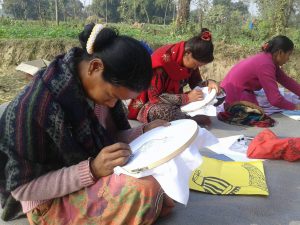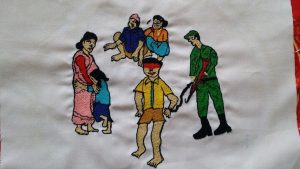I believe storytelling is about listening and observing. It may sound counterintuitive, but the most poignant and impactful stories I read or view are those that capture many layers of the protagonist. They are those that capture nuance and local context while simultaneously capturing the essence of our shared humanity. They are those stories where I don’t know the author or the person behind the camera, but I know they approached their role as a storyteller with respect, humility, and an unparalleled ability to listen and observe.
As a 2018 Peace Fellow in Kathmandu and Bardiya, Nepal, I am working with a community based organization called NEFAD, the National Network of the Families of the Disappeared and Missing, to support their work advocating for Nepal’s families of the disappeared and missing and providing livelihood support to women in the district of Bardiya who lost loved ones in the armed conflict.
Over 1,300 Nepali people were forcibly disappeared during the armed conflict in Nepal between 1996 and 2006. 224 of those disappearances were in Bardiya, the highest number in a single village. Their family members continue to seek justice and the truth about what happened to their loved ones. For many families, the loss of their family breadwinner had negative economic consequences. NEFAD established an embroidery cooperative comprised of 25 women in Bardiya. Through NEFAD’s embroidery training, the women have crafted quilt squares memorializing their stories and are working to establish their cooperative as a reliable livelihood source.
Women doing embroidery projects together
Memorial square depicting a man being taken from his family
A major component of my work involves telling the women’s stories through blogs, photos, and videos for advocacy purposes. One of my favorite definitions of the word advocacy is the following. Advocacy is the process of supporting and enabling people to express their views and concerns, access information and services, defend and promote their rights and responsibilities, and explore choices and options.
I like this definition because it captures what I value about advocacy work; that is, advocacy is the process of listening, observing, and amplifying the voices of people with great strength who may not have had an opportunity to tell their story. Responsible advocacy is an important part of the process of achieving positive social change and defending human rights as it sheds light on issues and challenges society may be unaware of or have forgotten about. With all of its potential comes great responsibility.
As with all advocacy efforts, there are many ethical and practical challenges, which I’ve briefly described below:
Ensuring the women’s safety: Politically charged issues including armed conflict and transitional justice may be sensitive issues. As a storyteller, my first priority is to do all I can to minimize the risk that they could experience negative consequences for sharing their story.
Women with agency: The women in Bardiya are more than the trauma they have experienced or any of the bad things that have happened to them. They are the protagonists in their stories, and I aim to portray them as women with identity, agency, and strength.
Power dynamics and privilege: As an American graduate student, I carry with me certain kinds of privilege. Perhaps some women do not want to relive their stories again. Perhaps some women feel they must relay their story in a certain way given my presence as an outsider, an American, or because of any other part of my identity. As Roxane Gay says, “You need to understand the extent of your privilege, the consequences of your privilege, and remain aware that people who are different from you move through and experience the world in ways you might never know anything about.”
Translation: Most of the women I will meet in Bardiya speak Tharu. Sarita and Prabal of NEFAD will translate, but it’s so easy for words to get lost in translation. Prior to traveling to Bardiya, I will work with Prabal to ensure that everything I intend to ask is translated into the appropriate local context or adjusted as necessary.
Regardless of the ethical or practical challenge of advocacy and development work, I hope that by listening and observing diligently and by approaching the work with humility, respect, and thoughtfulness, I can tell their stories with great care.
Posted By Komal Thakkar (Nepal)
Posted Jun 15th, 2018




11 Comments
Nity Jaiswal
June 15, 2018
Great insights Komal. I really enjoyed reading you blog. looking forward to reading more.
Komal Thakkar (Nepal)
June 22, 2018
Thank you so much, Nity!
Samantha Givens
June 18, 2018
Thanks Komal for a wonderful post! I’m excited to read more and follow along your journey.
Komal Thakkar
June 19, 2018
Thank you so much, Samantha!
Ali West
June 20, 2018
Komal, I love the mindset you have about advocacy and storytelling – I think it will make your fellowship experience extremely impactful and meaningful.
Komal Thakkar (Nepal)
June 22, 2018
Thank you, Ali! I appreciate it!
Corinne Cummings
June 20, 2018
Hi, Komal. I am one of AP’s new interns. It’s a pleasure to meet you via your blog post. What a fantastic way to advocate for women in Kathmandu and Bardiya, Nepal through their embroidery work. Visual storytelling, such as this embroidery project, is an excellent way to express the lives of Nepalian women and to share their experiences in their community. Art is also a wonderful tool to cope with trauma and hardship, as it provides an outlet for those to convey their feelings and emotions. You commented on power dynamics and privilege; it is critical to recognize the opportunities women have in the Global North, compared to women in the Global South. Thank you for pointing this concept out. The fact that you are able to provide a voice for these women by sharing their work is a privilege in itself. The work they are doing through embroidery is beautiful–they are very talented artists and deserve more appreciation for their work. Thank you for sharing through great photographs. I am looking forward to hearing more about your journey. Best wishes, Corinne.
Komal Thakkar (Nepal)
June 22, 2018
Hi Corinne! It’s nice to meet you virtually as well. I agree, visual storytelling and art is a great medium through which to share experiences and cope with hardship. I look forward to sharing photos and videos of their beautiful work.
Princia Vas
June 29, 2018
I really liked your perspective on storytelling. Who knew something as small as telling a story could have such a big impact . I’m glad you addressed the ethical and practical challenges of advocacy efforts as well!
iain
July 5, 2018
Lots of very wise reflections in this blog. Really look forward to getting to know these ladies through your profiles!
Donna Olson
July 10, 2018
Komal,
This is an insightful post about the challenges you will face in your role as a story teller. I especially like your reminder that “[t]he women in Bardiya are more than the trauma they have experienced or any of the bad things that have happened to them.” It appears that their stories are in good hands!